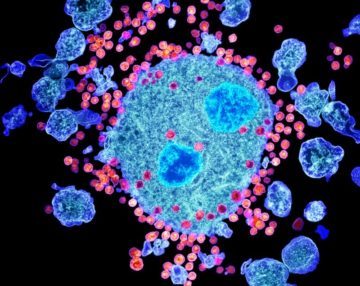T V Padma in Nature:
 An injectable drug that protects people at high risk of HIV infection has been recommended for use by the World Health Organization (WHO). Cabotegravir (also known as CAB-LA), which is given every two months, was initially approved by the United States Food and Drug Administration in December 2021.
An injectable drug that protects people at high risk of HIV infection has been recommended for use by the World Health Organization (WHO). Cabotegravir (also known as CAB-LA), which is given every two months, was initially approved by the United States Food and Drug Administration in December 2021.
Cabotegravir is currently manufactured by ViiV Healthcare, a UK-based company jointly owned by GSK in London, Pfizer in New York City and Shionogi in Osaka, Japan. On 28 July, the day that the WHO issued its recommendation, ViiV announced a voluntary licensing agreement in which up to three other companies would be allowed to produce and supply generic versions of the drug; these would be intended for use in 90 of the world’s lowest-income countries, where the majority of new HIV cases occur.
“We believe that widening access to cabotegravir could be game-changing in HIV prevention and could significantly contribute towards the goal of ending the HIV epidemic,” a ViiV Healthcare spokesperson said. But many are concerned that the drug will be too expensive to have an impact. Campaign groups say that the drug’s price tag — estimated at US$3,700 per vial in the United States — puts it out of reach of the poorest countries. The medical charity Doctors Without Borders has called the license “limited and disappointing”.
ViiV has promised to provide the drug at a “not for profit price” for public programmes in low income countries. It has not said what this price would be — but it has told Nature that it will be more than $10 per dose, the price that campaign groups are urging.
More here.
